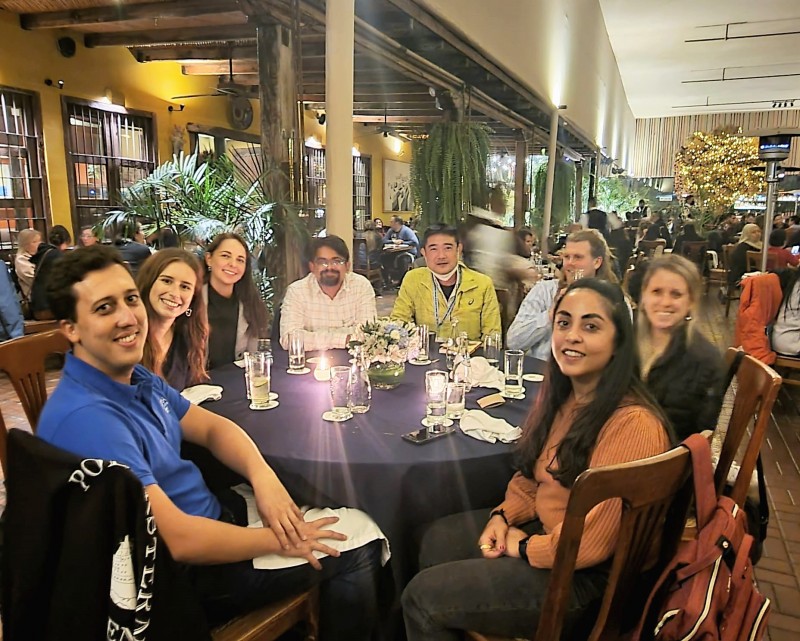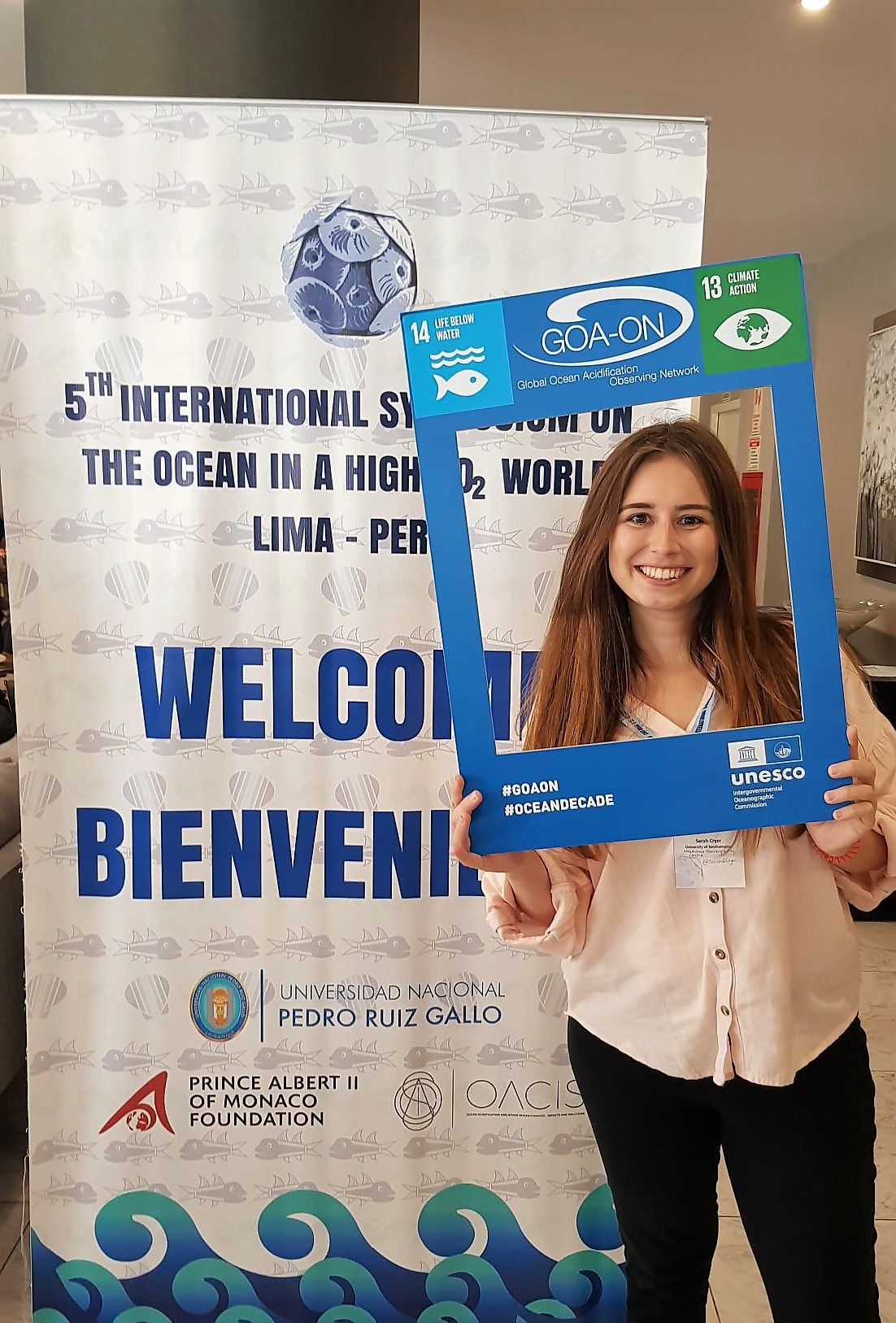5th International Symposium on the Ocean in a High CO2 World
Sarah Cryer
National Oceanography Centre & University of Southampton

I learned of the 5th International Symposium on the Ocean in a High CO2 World in 2019, but at the time it was too late to submit an abstract for the 2020 conference. Of course, not long after I learned of the conference, international travel shut down due to the pandemic, resulting in postponement of the conference. Jump to 2022 and I largely forgot about the conference, until I saw a tweet on the abstract deadline day. I hastily put together and submitted an abstract, but decided I would delay a decision about whether I would attend in person or virtually until a later date. My abstract was accepted for a talk, but I had reservations about whether I should plan to attend in person: I was concerned about the carbon footprint of my long distance travel to get to Lima from the UK, the time it would take me to get there (I’m approaching the crunch time of writing my PhD thesis), and the toll the travel, would take on my body (I currently have Long Covid), and weighing up the cost/benefit of what would normally be simple activities is a constant battle to ensure I expend the energy I do have as efficiently and effectively as possible. I knew, however, this conference was likely going to be the most relevant conference to happen during my PhD and that, therefore, it would be the best opportunity I would have to network internationally with researchers across my field. After much deliberation, and with a push from my PhD advisors, I ultimately decided to go, making the tough decision the day before registration deadline. I can now say that that was one of the best decisions I’ve made during my PhD.
So, hot on the heels of the Challenger 150 conference (which was only the week before!) I jumped on a plane to Lima… or rather I tried to. After 10 hours in Heathrow and a flight cancellation and re-booking (thankfully by the airline!) did I finally depart for Lima – a day later than planned (not a brilliant start given my fears relating to how I’d cope long covid wise!). Eventually, I arrived at my hotel in Lima at 2am local time, 48 hours after I’d left Southampton. The small consolation about the various delays and arriving so late at night was that my body clock seemed to be so confused, that I seemed to escape the effects of jet lag!
I got myself settled and refreshed my excitement for going to the conference. On the Monday evening the conference kicked off with an early career ice breaker, the kind of event I always find a bit daunting at first, and I was comforted by having Emily (a fellow PhD at NOCS) with me. Nevertheless, I had a fun time at the ice breaker and tried my first Pisco Sours, a Peruvian staple!
Tuesday started early with opening addresses in both English and Spanish (how I wish I was bilingual!) and some Peruvian dancing! Which was a fantastic intro to the conference and a great way to wake everyone up! Never have I attended a conference where I am so torn about which session to attend. Every session was relevant, and with there being 5 parallel sessions per day it was hard to choose! I decided to go with the sessions that were most relevant to the 3rd Chapter of my PhD, since that’s my current focus and made up the content of my conference presentation. I am still developing the story told by my data for this chapter, so I wanted to gain some insight and inspiration. In the afternoon on Tuesday, I focussed on attending sessions about coastal and estuarine processes, and saw talks from Mexico to Spain to the Philippines – it was so refreshing to be exposed to ongoing research from around the world and listen to researcher in-person after so many online meetings during the past 2 years.
The major reason for attending in-person was both to get external feedback on my research and to meet people. Though I am in favour of hybrid conferences, because the ability to attend virtually allows for better inclusivity and a smaller carbon footprint, I have felt that online conferences make it difficult to connect with people on a personal level. I presented my talk on the Wednesday morning and I have never had an audience so engaged! Sometimes people don’t want lots of questions, but for me it’s exciting, it shows people are interested in what you are doing and that they were able to follow the presentation. People came up to me after to talk further and I began to make a lot of new contacts! Wednesday was a busy day and cumulated with the conference dinner. I’d signed up for it at home while feeling brave, but once in Lima it dawned on me that I wouldn’t know anyone at the dinner. What if everybody there already knew each other?! I shouldn’t have worried though – I met some other ECRs before the event and everyone at our table was super friendly. I wasn’t the only person who had come to the dinner alone!
The rest of the week was great, I continued to meet more people and broaden my awareness of international research in ocean acidification. I think holding such a major conference outside of Europe or North America was really beneficial as it meant there was a large Latin American contingent. The week was busy, but I learned lots and pushed myself out of my comfort zone. If I was to summarise what I have learned (in addition to the science itself) – it is push yourself out of your comfort zone. Everybody is trying to meet people so just say hi, complimenting people on their talk is a great intro (you don’t need to have an intelligent question to ask), attend ice breakers and dinners even if it’s terrifying. This was hands down the friendliest conference I have attended, and I think that’s a result of three things (a) a lot of people attended alone (b) the size of the conference (~200 people in person) and (c) everyone had very similar interests. So, if you are in ocean acidification research you should definitely attend the next conference in 2026! I hope I will be there again too!

Profile: After a BSc (Hons) in Environmental Geoscience from the University of Edinburgh and a MSc in Geochemistry from the University of St Andrews I decided to take the plunge and move down south to do an Oceanography PhD at the National Oceanography Centre and University of Southampton. I am now in the final year of my PhD investigating coastal biogeochemistry in Belize. My research focuses on both temporal and spatial resolution processes happening from river to reef. I use a combination of both traditional discrete water samples and autonomous technology to understand coastal carbonate chemistry in this region.
Latest News
Royal Society Publishing Photography Competition 2025
Please see a message from the Royal Society below:
We are delighted to announce that the 2025 Competition is now open for entries until 15 August for a chance to win £1000! The competition celebrates the power of photography in conveying the wonder of science happening all around us and photographs can be submitted in the categories of: Astronomy, Behaviour, Earth Science and Climatology, Ecology and Environmental Science, and Microimaging.
The competition is free to enter and open to anyone studying or working in science at graduate level or above. Category winners will receive a one-year membership to the Royal Photographic Society and the overall winner will receive a grand prize of £1,000. Find out more: https://bit.ly/RSPphotocomp
October 2025 MEDIN Workshop: Marine Data Management, Governance and the MEDIN toolset
The Marine Environmental Data and Information Network (MEDIN) are pleased to announce that registration is now open for the next occurrence of our popular free online training workshop: ‘Marine Data Management, Governance and the MEDIN toolset’ on the 13th – 17th October 2025 on OceanTeacher Global Academy.
Marine Data Management, Governance and the MEDIN toolset
The Marine Environmental Data and Information Network (MEDIN) and OceanWise are delighted to invite you to attend our popular free online training workshop: ‘Marine Data Management, Governance and the MEDIN toolset’ on the 19th – 23rd of May 2025.
